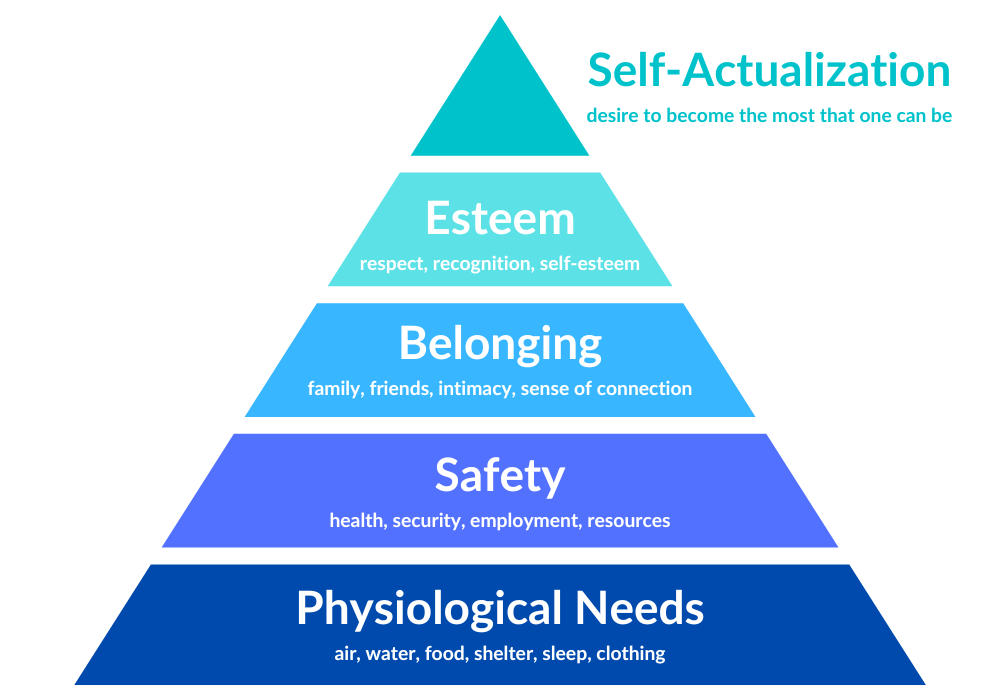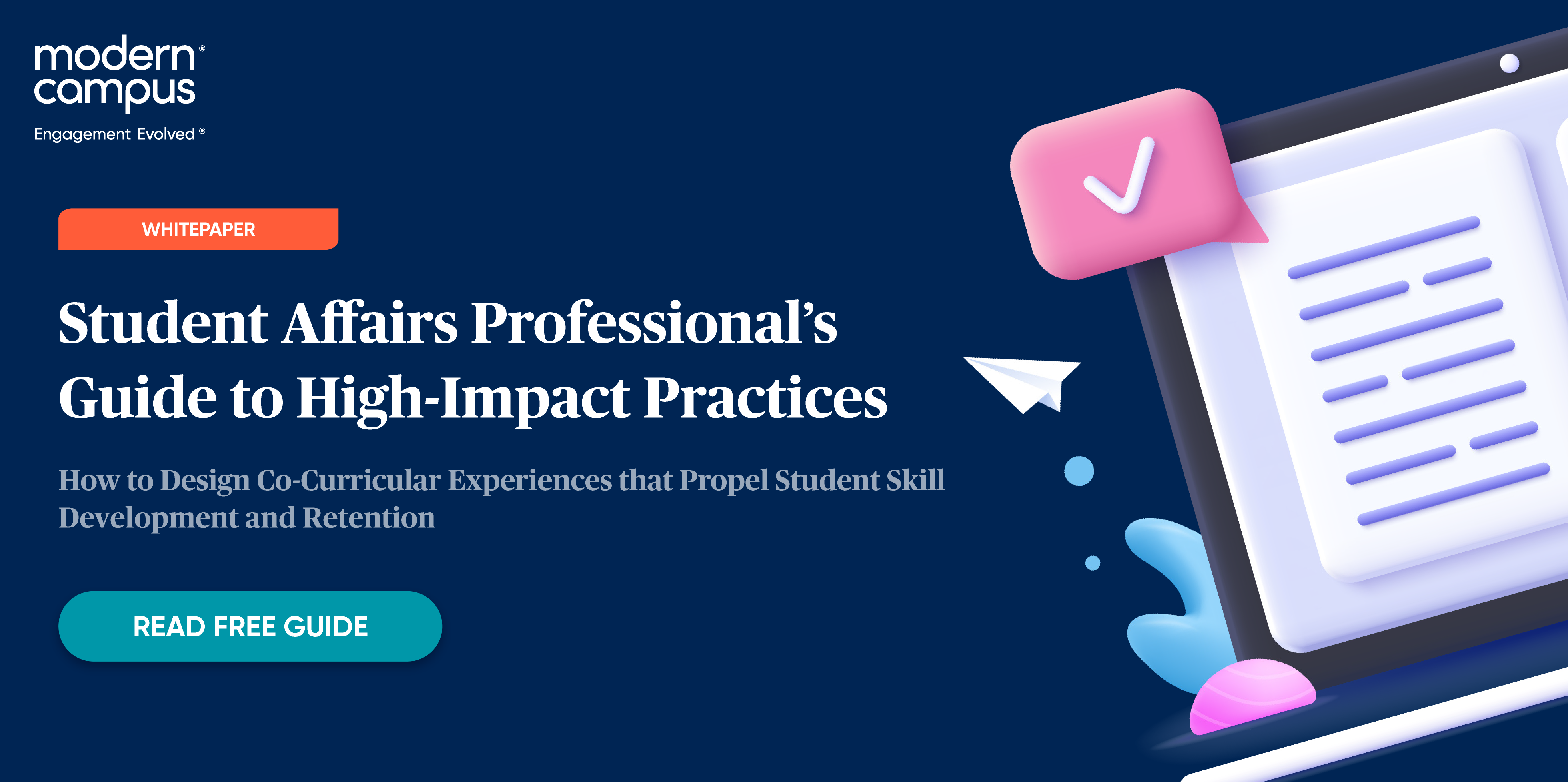You’ve probably seen the memes: colorful pyramids satirizing Maslow’s Hierachy of Needs by listing modern technologies—such as WiFi or Netflix—at the bottom.
But psychologist Abraham Maslow’s real theory can benefit student affairs professionals far beyond providing a quick laugh.

Maslow first wrote about his theory in 1943, in a paper entitled “A Theory of Human Motivation” published in the journal Psychological Review. As Simply Psychology summarizes it:
Maslow's Hierarchy of Needs is a motivational theory in psychology comprising a five-tier model of human needs, often depicted as hierarchical levels within a pyramid.
Maslow initially stated that individuals must satisfy lower-level needs before progressing up to those higher in the pyramid. But, as he later clarified, that progression is not all-or-nothing. Rather than needing to finish one level completely—like in a video game or a college course—a deficit need has to be 'more or less' satisfied. Only then, will the individual's desires redirect toward meeting the next higher set of needs.
Thus, when viewed through the lens of student affairs, Maslow’s theory can help us determine what needs to prioritize helping learners meet. The hierarchy reveals what needs should be met first before we can move student’s through more ambitious goals in line with strategic initiatives set by the college or university.
Below, you’ll find a review of the five tiers, along with ideas for how student affairs professionals can support students in satisfying those needs.
Tier 1: Physiological
Maslow’s Hierarchy of Needs helps reminds us that students cannot — and with their wellbeing in mind, should not — focus on engaging in campus life if their physiological needs aren’t met.
This prioritization played out in a striking way during the onset of the COVID-19 pandemic, as colleges and universities worldwide canceled or rescheduled in-person events indefinitely. Programs that student affairs professionals had spent many months planning (and budgetary dollars invested) in were scrapped.
Instead, the field shifted to ensure that students had their lower level needs met. Some SA pros helped run drive-thru food and clothing pantries. Others managed limited residential halls, kept open for students who had no other place to call home. And some professionals even called or texted their students, inquiring about their physiological wellness.
Although emergency pandemic protocols have largely ended, this experience can serve as an ongoing reminder: we cannot expect students to fully engage in campus life if they’re tired, thirsty, hungry or housing insecure.
Ways Student Affairs can support students’ physiological needs:
- Running food pantries and addressing food insecurity
- Organizing clothing drives
- Advocating for and advertising needs-based scholarships to cover housing
- Keeping residential halls open during academic breaks
- Providing fresh water and healthy food at events and around campus
- Scheduling programs with students’ sleep needs in mind
San Bernardino Valley College Kept Underserved, At-Risk Students Enrolled During the Pandemic
Learn how a community college assesses and provides for students' most critical needs—including running a food & family supply bank.
Tier 2: Safety
Maslow’s safety needs are closely related to security; people want to have control and order over their lives. In addition to physical safety, this includes financial security and mental wellness.
As with physiological needs, a student who lacks safety or feels unsafe will struggle to progress through Maslow’s hierarchy. Put simple, an unsafe student will be unlikely to engage in student life and excel at your institution.
Ways Student Affairs can support students’ safety:
- Collaborating with local and/or campus police to design safe events on and off campus
- Promoting mental health services, including peer mentors, suicide hotlines and counseling centers
- Offering alcohol-free social events & activities
- Connecting students with victim advocates and violence prevention experts
- Running programs and services that promote safe sexual practices
- Promoting financial scholarships, campus jobs and paid internship programs
- Teaching students personal budget and finance skills
- Designing programs that optimize accessibility and universal design
- Implementing anti-hazing policies
Tier 3: Belonging
Here we begin to get into the needs that Student Affairs traditionally aims to address.
Everyone craves a sense of belonging — whether it be through family, friends, a religion, a country or any other type of community. If these needs aren't meet, the individual may become lonely, depressed, withdrawn and angry.
As applied to higher ed, students want to belong within their college or university communities. They want to connect socially, mentally, emotionally and intellectually with their peers, faculty and staff. Otherwise, they’re likely to transfer to another institution or stop out of higher education entirely.
Thus, through this need, student affairs is critical to supporting enrollment and retention.
Ways Student Affairs can foster belonging:
- Designing programs that connect students with their peers
- Facilitating community within the residence halls and among commuter students
- Providing students’ families with ways to get involved in campus life
- Encouraging the creation and success management of student organizations
- Partnering with local communities and organizations to connect students with opportunities for civic engagement
- Building supportive relationships between students and staff
- Empowering students with skills to resolve interpersonal conflicts
- Developing interventions for unengaged students
The Impact of College Student Engagement, by the Numbers
Learn how students' sense of belong and community positively influences GPA, workforce readiness, retention and more.
Tier 4: Esteem
The fourth tier within Maslow’s hierarchy speaks directly to the goal of higher education. All colleges and universities aim to provide students with the proper skills and tools to establish rewarding careers after graduation. Achieving this requires students to feel confident, strong and self-assured; it requires them to achieve a sense of esteem.
Although self-esteem is an internal quality, the great majority of people rely on external reinforcements to reach and sustain it. They crave validation from others, whether it come in the form of rewards, verbal praise or esteemed titles. Student affairs professionals can also provide students with opportunities to practice their knowledge, skills and talents — and as a result, earn that validation.
Ways Student Affairs can foster students’ esteem:
- Promoting career services to help students jumpstart their career search
- Encouraging students to apply to internship programs
- Recognizing students’ accomplishments through awards, ceremonies, certificates and verbal praise
- Fostering the development of essential skills through programmatic learning outcomes
- Empowering students to take on leadership roles, plan campus programs and start new student clubs and organizations
- Connecting students with faculty or staff mentors
- Encouraging students to explore their interests and make autonomous decisions about their future
- Celebrating student milestones, beyond graduation, such as completing final exams or selecting a major
Tier 5: Self-actualization
Self-actualization is the achievement of one’s full potential. Maslow described it as “the desire to become more and more what one is, to become everything that one is capable of becoming.”
Since everyone has different world views, talents, values and interests, self-actualization will look different for each of your students. Some may pursue self-actualization – in total or in part – through the performing arts. Others will seek it by creating societal change, becoming a parent or inventing new technologies. The goal of student affairs professionals, then, should be to help students clarify the internal and external qualities they care about most.
Also of note: Maslow believed that full self-actualization is relatively rare. Rather, most people continually work to reach it, experiencing moments of joy and transcendence along the way. Those who get the closest to self-actualization tend to be highly creative, autonomous, objective, concerned about humanity and accepting of themselves and others — all qualities you can help your students develop.
Ways Student Affairs can help students strive toward self-actualization:
- Engaging students in high-impact practices
- Encouraging students to explore interests outside of their academic major
- Promoting self-reflection through discussion, interviews, activities and forms
- Demonstrating your own self-actualization journey by sharing your passions, values and interests
- Facilitating group discussions on challenging topics, such as social dilemnas or global trends
- Challenging students to solve complex problems on their own
- Helping students articulate their values and set goals
- Asking student employees and leaders to self-evaluate their performances
